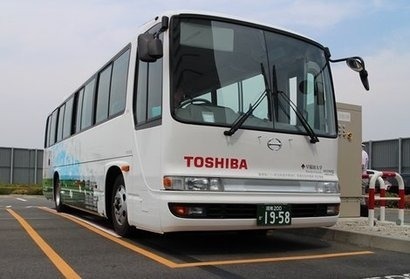
Field tests on the bus started on 1st June and will continue until December. The 45-seat bus is powered by a long-life, high-output SCiB lithium-ion rechargeable battery. It will make regular trips between All Nippon Airways Co Ltd facilities in Tonomachi, Kawasaki and Haneda Airport in Tokyo. This 11 kilometre journey will test the bus and its performance under various traffic conditions and will allow Toshiba to verify the convenience and practicality of contactless charging, along with its contribution to reducing carbon dioxide (CO2) emissions.
The contactless charger has been designed in collaboration with Professor Yushi Kamiya of the Faculty of Science and Engineering at Waseda University. It replaces conventional electromagnetic induction with an innovative and highly promising magnetic resonance system that is installed in the ground beneath the bus. Charging begins once the driver pushes a button on the dashboard and there is no risk of electric shock due to the system being cable-free. Electromagnetic induction requires close alignment with the battery, and a small distance separating charge transmitting pad and receiving pad. However, magnetic resonance can be misaligned by as much as 20 cm along the width and 10 cm along the length and the transmitting and receiving pads can be as far as 10 cm apart. Tests have verified that the system’s radio emission level meets limit regulations and do not interfere with radio signals of nearby equipment.
The SCiB battery installed in the test bus is rugged, reliable and has a long life, with almost no drop in performance even after 15,000 quick charge and discharge cycles. It is highly suited for use on shuttle buses operating at locations such as tourist sites and airports, which must combine heavy use with frequent and fast charging. Furthermore, it only takes around 15 minutes to charge to a level necessary for the EV bus to run one-way between the test sites.
The battery also delivers high output that, combined with improvement in performance of drive components allows the bus to achieve a top speed surpassing that required for safe operation on expressways.
“I think we have developed a high-quality system by combining the new, convenient contactless charger with a high-power SCiB suited to frequent charging” said Professor Kamiya. “I look forward to the field testing, as it will be the first time where a bus charged in this way has operated on the expressway. I am confident that the results will make a useful contribution to the promotion of EV buses.”
Development of the system has been supported by the Ministry of the Environment under its Low Carbon Technology Research and Development Program since 2014. A field test that deployed a small EV bus incorporating a similar charging technology started in February this year and will run until December.
Toshiba will continue research and development of contactless charging and other advanced technologies that contribute to reducing environmental loads, and work to improve the quality of urban transport by providing SCiB for various transportation systems.
For additional information:

